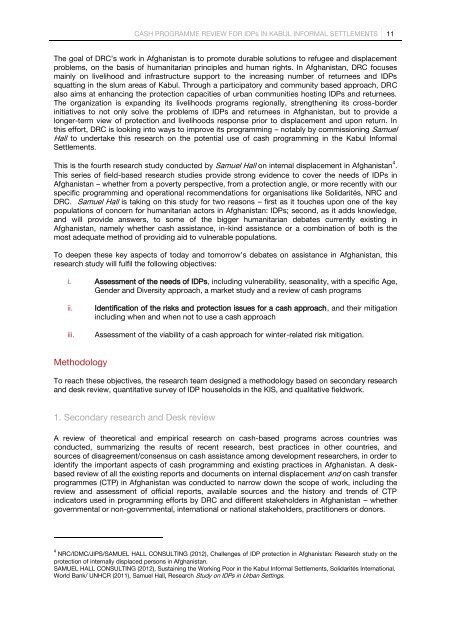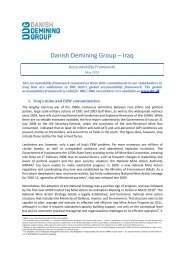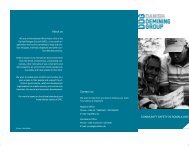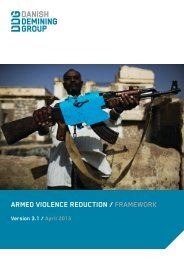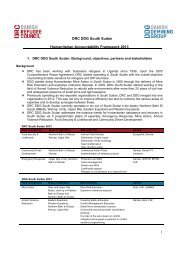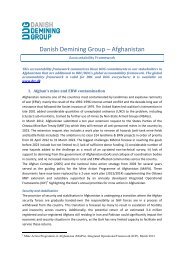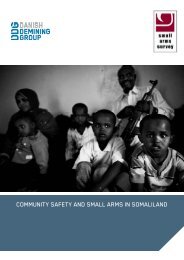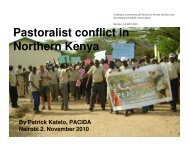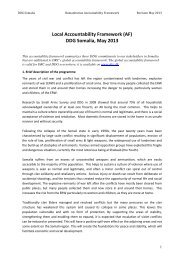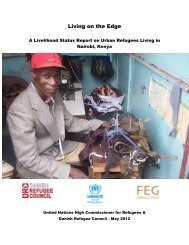10 DRC / DANISH REFUGEE COUNCILINTRODUCTIONBackgroundIn 2009, <strong>the</strong> growing recognition of <strong>the</strong> internal displacement trends in Afghanistan – due to conflict,natural disasters and man-made disasters – and <strong>the</strong> tendency for displaced populations to settle,often permanently, in urban or peri-urban settings led <strong>the</strong> aid community to focus its attention on <strong>the</strong>living conditions of IDPs and returning refugees living in <strong>the</strong> Kabul Informal Settlements (KIS). If muchhas been done to better understand <strong>the</strong> profiles and conditions of KIS inhabitants, a key questionremains: what types of interventions are <strong>the</strong> most appropriate, and effective, in an urban contextwhere displaced households live in informal settlements, without deeds to <strong>the</strong>ir land or shelter, oftensquatting private or government land? What opportunities exist, if any, for cash-based assistance torespond to <strong>the</strong> needs of internally displaced populations (IDPs) living in <strong>the</strong> Kabul InformalSettlements?Among <strong>the</strong> assumptions circulating around that time were that i) most of <strong>the</strong> KIS inhabitants couldnot be defined as vulnerable IDPs, but more generally as rural-urban migrants, and that ii) those inrural areas should receive priority assistance given <strong>the</strong> access to local markets, services andemployment in urban settings. These assumptions have since evolved with clear evidence to <strong>the</strong>contrary. A joint World Bank / UNHCR study released in May 2011 2 showed that IDPs living in urbansettings were more vulnerable, according to a range of socio-economic indicators, than <strong>the</strong> rest of<strong>the</strong> urban poor. Similar studies on <strong>the</strong> situation of IDPs in Afghanistan 3 have fur<strong>the</strong>r highlightedexisting vulnerabilities in access to shelter, employment, food, water and o<strong>the</strong>r services for displacedpopulations. Those living in <strong>the</strong> country’s main capital are not an exception.As media <strong>report</strong>s from <strong>the</strong> winter 2012 have illustrated, illness and death among <strong>the</strong> elderly andchildren were common occurrences in <strong>the</strong> harsh winter conditions. As a result, <strong>the</strong> humanitariancommunity – along with <strong>the</strong> Government of Afghanistan – have stepped up coordination efforts toensure increased emergency assistance capacity to cope this winter. Several NGOs – Solidarités,Action contre la Faim, Welthungerhilfe, Johanniter, to name a few – have developed specificprograms tailored to <strong>the</strong> Kabul Informal Settlements – covering a range of interventions; while UNagencies such as UNHCR and WFP have continued to integrate over 50 KIS sites in <strong>the</strong>irwinterization assistance, in coordination with <strong>the</strong> Ministry of <strong>Refugee</strong>s and Repatriation (MoRR). Jointneeds assessments, distribution of fuel (firewood and coal), food, winter clothing, tarpaulin andblankets began in early December 2012, with coordination efforts on-going throughout <strong>the</strong> winterwith <strong>the</strong> leadership of <strong>the</strong> Government of Afghanistan’s Ministry of <strong>Refugee</strong>s and Repatriation(through its emergency unit) and <strong>the</strong> UN Office for <strong>the</strong> Coordination of Humanitarian Affairs (OCHA)with <strong>the</strong> support of <strong>the</strong> Kabul Informal Settlement (KIS) Task Force members.In this context, <strong>the</strong> <strong>Danish</strong> <strong>Refugee</strong> <strong>Council</strong> (DRC) is a more recent stakeholder. DRC has beenpresent in Afghanistan for two years bringing expertise in <strong>the</strong> fields of protection and livelihoods fromo<strong>the</strong>r emergency and conflict settings throughout <strong>the</strong> world – including a thorough experience incash based programming in <strong>the</strong> Horn of Africa (Somalia, Ethiopia, Kenya, Yemen) and Middle-East(Iraq, Syria, Lebanon, Jordan, Turkey, Tunisia and Libya).2 World Bank/ UNHCR (2011),Samuel Hall, Research Study on IDPs in Urban Settings.3 MAJIDI, N. (2011), Urban Returnees and Internally Displaced Persons in Afghanistan, in 2011 Responding to Conflict-InducedDisplacement in Protracted <strong>Refugee</strong> Situations: Middle East Institute (MEI) and <strong>the</strong> Foundation pour la Recherché Stratégique(FRS), “Pathways to Enhancing Transatlantic Cooperation”. NRC/IDMC/JIPS/SAMUEL HALL CONSULTING (2012), Challengesof IDP protection in Afghanistan: Research study on <strong>the</strong> protection of internally displaced persons in Afghanistan.SAMUEL HALL CONSULTING (2012), Sustaining <strong>the</strong> Working Poor in <strong>the</strong> Kabul Informal Settlements, Solidarités International.METCALFE, V., HAYSOM, S. and MARTIN, E. (2012), Sanctuary in <strong>the</strong> City? Urban Displacement and Vulnerability in Kabul,HPG Working Paper.
CASH PROGRAMME REVIEW FOR IDPs IN KABUL INFORMAL SETTLEMENTS 11The goal of DRC’s work in Afghanistan is to promote durable solutions to refugee and displacementproblems, on <strong>the</strong> basis of humanitarian principles and human rights. In Afghanistan, DRC focusesmainly on livelihood and infrastructure support to <strong>the</strong> increasing number of returnees and IDPssquatting in <strong>the</strong> slum areas of Kabul. Through a participatory and community based approach, DRCalso aims at enhancing <strong>the</strong> protection capacities of urban communities hosting IDPs and returnees.The organization is expanding its livelihoods programs regionally, streng<strong>the</strong>ning its cross-borderinitiatives to not only solve <strong>the</strong> problems of IDPs and returnees in Afghanistan, but to provide alonger-term view of protection and livelihoods response prior to displacement and upon return. Inthis effort, DRC is looking into ways to improve its programming – notably by commissioning SamuelHall to undertake this research on <strong>the</strong> potential use of cash programming in <strong>the</strong> Kabul InformalSettlements.This is <strong>the</strong> fourth research study conducted by Samuel Hall on internal displacement in Afghanistan 4 .This series of field-based research studies provide strong evidence to cover <strong>the</strong> needs of IDPs inAfghanistan – whe<strong>the</strong>r from a poverty perspective, from a protection angle, or more recently with ourspecific programming and operational recommendations for organisations like Solidarités, NRC andDRC. Samuel Hall is taking on this study for two reasons – first as it touches upon one of <strong>the</strong> keypopulations of concern for humanitarian actors in Afghanistan: IDPs; second, as it adds knowledge,and will provide answers, to some of <strong>the</strong> bigger humanitarian debates currently existing inAfghanistan, namely whe<strong>the</strong>r cash assistance, in-kind assistance or a combination of both is <strong>the</strong>most adequate method of providing aid to vulnerable populations.To deepen <strong>the</strong>se key aspects of today and tomorrow’s debates on assistance in Afghanistan, thisresearch study will fulfil <strong>the</strong> following objectives:i. Assessment of <strong>the</strong> needs of IDPs, including vulnerability, seasonality, with a specific Age,Gender and Diversity approach, a market study and a review of cash programsii.iii.Identification of <strong>the</strong> risks and protection issues for a cash approach, and <strong>the</strong>ir mitigationincluding when and when not to use a cash approachAssessment of <strong>the</strong> viability of a cash approach for winter-related risk mitigation.MethodologyTo reach <strong>the</strong>se objectives, <strong>the</strong> research team designed a methodology based on secondary researchand desk review, quantitative survey of IDP households in <strong>the</strong> KIS, and qualitative fieldwork.1. Secondary research and Desk reviewA review of <strong>the</strong>oretical and empirical research on cash-based programs across countries wasconducted, summarizing <strong>the</strong> results of recent research, best practices in o<strong>the</strong>r countries, andsources of disagreement/consensus on cash assistance among development researchers, in order toidentify <strong>the</strong> important aspects of cash programming and existing practices in Afghanistan. A deskbasedreview of all <strong>the</strong> existing <strong>report</strong>s and documents on internal displacement and on cash transferprogrammes (CTP) in Afghanistan was conducted to narrow down <strong>the</strong> scope of work, including <strong>the</strong>review and assessment of official <strong>report</strong>s, available sources and <strong>the</strong> history and trends of CTPindicators used in programming efforts by DRC and different stakeholders in Afghanistan – whe<strong>the</strong>rgovernmental or non-governmental, international or national stakeholders, practitioners or donors.4 NRC/IDMC/JIPS/SAMUEL HALL CONSULTING (2012), Challenges of IDP protection in Afghanistan: Research study on <strong>the</strong>protection of internally displaced persons in Afghanistan.SAMUEL HALL CONSULTING (2012), Sustaining <strong>the</strong> Working Poor in <strong>the</strong> Kabul Informal Settlements, Solidarités International.World Bank/ UNHCR (2011), Samuel Hall, Research Study on IDPs in Urban Settings.


